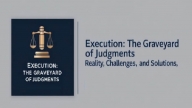Legal blog
There is an execution against me in the UAE; what should I do?

In the name of God, the most gracious, the most merciful
Sometimes, many people find themselves with stressful financial expenses, which makes them vulnerable to defaulting on their financial obligations, whether they are banking, commercial, personal, or consumer. In such cases, the defaulting person may find that enforcement proceedings have been brought against him, because of a check or by an authoritative judgment and he is confused about how to deal with these frightening executive proceedings.
Therefore, we present this simplified article for you to briefly explain the executive procedures, how the person executed against him deals with them, and the options he can exercise to implement the ruling smoothly while decreasing the damage of implementation as much as possible.
First: Starting the Execution
Execution begins when the enforcer opens an execution file and registers it with the enforcement court. When they do so, a notice will be sent to the enforcer against whom the execution is sought, and this notice is often sent through an SMS text message or an email.
The announcement will include extremely important information, such as the executive file number and type, and the duration within which the enforcer against whom the execution is sought, must carry out voluntary execution. Usually, the specified duration for voluntary execution is 15 days, and in this case, the countdown starts from the day after the enforcer whom the execution is sought, receives the announcement.
Second: The Voluntary Execution Period:
As mentioned above, the voluntary execution period is usually 15 days, and in some cases, it can be 7 days, and often this period is stated in the advertisement itself. During this period, there will be no enforcement actions against the enforcer against, so there will be no seizure of accounts or vehicles and no arrest warrants.
During this period, we recommend paying the full amount owed if it is available to the creditor. If the full amount is not available, or if the amount owed is not known to the creditor, we advise paying a part of the amount and submitting a request to the enforcement judge to show the intention to pay and request no enforcement actions to be taken, giving the creditor a deadline to pay the remaining amount.
Third: The Execution Accountant Report
When opening an execution file, the executive department accountant is tasked with preparing a report (sometimes called an accounting memorandum) to show the total amount that must be paid. Usually, this amount is the sum of the judgment amount plus the lawsuit fees and execution fees. The report is usually issued within days of opening the execution file, and it is advisable to review it as soon as it is received by the defendant for notification.
Sometimes, errors in accounting reports may occur, and the numbers mentioned in the report may be incorrect. In this case, the enforcer against him must file an "objection to the accounting report," explaining the errors in the report and providing evidence of this error. If the execution judge is convinced, the accounting report will be amended. Execution accounting reports are not final decisions, and they are subject to modification and correction.
Fourth: After the Voluntary Implementation Period
After the specified period in the notice to fulfill the amount executed, the enforcement judge issues his decisions against the executor, especially if the executor did not initiate payment during the voluntary execution period. Usually, the judge issues an order to freeze bank accounts and seize vehicles, and in executions against companies, it is customary to freeze the commercial license as well.
Issuing an execution judge for these decisions alone does not mean that no other decisions will be issued besides them. At this stage, the applicant for execution can submit whatever requests they want to obtain the amount executed for, such as: requesting arrest and bringing, seizing properties, seizing stocks and bonds, travel bans, seizing assets, and more.
If the enforcement applicant submits any request as mentioned above, the request will be subject to the discretion of the enforcement judge. However, if no amount has been paid by the enforcer against him, the likelihood of the enforcement judge approving the enforcement applicant's requests is very high. If the enforcement applicant does not submit any requests during this period, the enforcement judge will be limited to the orders he issued previously.
Fifth: Implementation Sessions
The enforcement court sessions are not like regular court sessions; you can't submit memoranda or requests to discuss the issued judgment. The main purpose of these sessions is for the enforcement judge alone to review the execution file and stay updated on any developments. However, you can request to attend and explain the circumstances and facts to the enforcement judge or submit an important request.
Sixth: Execution orders have already been issued against me, what should I do?
Don't worry, if the executive orders are issued against you and you can pay, even partially, you can pay part of the amount while applying for installments for the remaining amount. The request is subject to the judge's assessment, as he may approve or reject it. Therefore, we advise you to submit the request with the documents proving your financial situation to convince the judge that you are suffering financially, such as a lease contract, certificate of banking obligations, school fees, evidence of other execution files, a certificate from charitable organizations, salary certificate to prove the limited salary you receive monthly, water, electricity, and communication bills.
Generally, it's not advisable to overdo it with the attachments or make the request too lengthy. If the judge agrees to installment payments, we recommend sticking to the monthly installments on time. As long as you're committed to paying the installments on time, there won't be any enforcement actions against you, except for travel restrictions for the non-citizen defendant, as the enforcement judge may keep the travel ban as a guarantee for the execution applicant.
The maximum installment period is 3 years, but in practice, it's extremely rare for enforcement judges to stick to this duration. The judge's decision on the installment period depends on the amount to be paid, your financial situation as proven by documents, and other factors.
Sometimes, the execution judge does not decide on the installment request and refers the matter to the execution applicant so that he can decide whether to approve the installments or not. If this happens, we advise communicating with the person seeking implementation to offer a settlement, convince him to pay in installments, and offer him guarantees, if any.
When the enforcer against him feels that he will not be able to pay one of the installments on time due to a specific financial circumstance, we advise submitting a request to the enforcement judge to state this along with requesting another deadline to pay this installment specifically, pledging to pay, and submitting the necessary evidentiary documents.
Seventh: An arrest warrant was issued. How should I act?
If a subpoena has already been issued, you have several options available:
A - Submit an installment request as we explained in "Sixth" above. Do not forget to prove your seriousness in requesting installments by actually paying the first installment before submitting the request.
B - If the execution file is in the Emirate of Dubai, you can submit a request to cancel the seizure and summons because the person requesting the execution did not provide proof of the suitability of the enforcer against him. In the Emirate of Dubai alone, a judicial decision was issued stating that the person requesting execution must prove the financial ability of his opponent against whom the execution is being carried out. Otherwise, he may not issue an order to arrest and bring the person executed against him. You can submit a request to this effect to the enforcement judge to cancel the seizure and summons. As for the rest of the emirates of the country, the person being executed can submit documents proving his financial inability, and then request the cancellation of the seizure based on them, because the burden of proving financial inability in the rest of the emirates is borne by the person being executed against them. If the judge rejects the request to cancel the arrest warrant, do not despair. You can file a grievance against his decision within seven days from the date of his refusal to cancel the arrest warrant.
C - submitting a request for a grace period for payment, and paying part of the amount for which it was executed.
D - If you own money that you do not mind being seized, such as accounts in a specific bank, real estate, or shares, and these funds cover the entire amount for which it was executed, you can submit a request to the enforcement judge to cancel the arrest warrant and just seize those funds and claim the amount for which it was executed. Just from that money.
E - If you suffer from a health condition that does not make it possible for you to be detained, you can submit the approved medical report proving this, and request the cancellation of the arrest warrant.
F - If you are over 70 years old, a warrant for arrest may not be issued.
G - If you have a son or daughter who is not yet 15 years old, and your husband/wife has died or is imprisoned for any reason, you can submit a request for annulment.
H - If you are a pregnant woman, you can submit a request to cancel the arrest warrant after two years from the date of childbirth.
Eighth: A travel ban was issued, what should I do?
If you are an Emirati citizen, you can submit a request to cancel the travel ban, stating the reason for travel, submitting supporting documents, and confirming that you are a citizen and there is no fear of fleeing the country.
However, if you are a non-Emirati, it is difficult to cancel the travel ban as long as you do not pay the full amount for which it was executed. Even if you pay most of it, the travel ban will remain until it is fulfilled in full. However, there is only one solution, which is to nominate a warrantee or guarantor to the court. In this case, you can submit a request to cancel the travel ban, stating the reasons for travel, providing evidence of those reasons, pledging to return to the country after the end of travel, and submitting documents of a warranty.
The guarantor may be a guarantor in debt or a guarantor of the soul (the guarantor of the soul is also called the guarantor of the summons). The guarantor who is in debt becomes personally responsible for the amount executed for him, as he bears a high risk. As for the self-guarantor - or the summons guarantor - he undertakes to bring you to the enforcement judge upon completion of your travel to submit your passport again to the enforcement court so that the travel ban order against you can be reinstated after your return.
You can submit a request to cancel the travel ban, provide a guarantor, and specify the capacity of the guarantor (do you want him to be a debtor guarantor or a self-guarantor?), and the request is subject to the discretion of the enforcement judge, as he may approve or reject it.
Ninth: The enforcement is against a limited liability company
If the person being executed against is a limited liability company, the seizure of accounts, vehicles, stocks, bonds, and assets will be carried out against the company itself. As for the partners (owners) of the company, no procedures will be issued against their funds. The arrest warrant and the travel ban order, it is issued in the face of the company's legal representative, who is either the company's director or the chairman of its board of directors.
Tenth: What are the different execution orders and what is the difference between them?
There are many orders that the enforcement judge can issue to force the person executed against him to pay. Here we provide a simple explanation for each.
A- Arrest warrant: It is an order to arrest the person against whom the execution was carried out (if he is a person) or the director of the company against whom the execution was executed, so that he is arrested by the police and taken to a police station and then presented to the enforcement judge so that the judge decides whether to imprison him or not.
B- Accounts Freezing: An order of the Central Bank to be circulated to all banks operating in the country to freeze the bank accounts of the person against whom the execution is being carried out and transfer them to the account of the Execution Court.
C- Vehicle seizure: An order directed to the police to stop any car owned by the person executed against him and offer it for sale at a public auction and pay the sale price to the account of the enforcement court.
D- Seizure of assets: An order directed to the enforcement officer (i.e., an employee of the enforcement court) to go to the headquarters of the person executing against it to seize the assets (furniture, appliances, goods, luggage, etc.) and then sell them in a public auction and transfer the amount to the account of the enforcement court.
E- Seizure of shares and bonds: An order directed to the financial markets to seize the shares and bonds of the executor against whom the executor is registered in his name with these markets.
F- Property seizure: An order directed to the competent municipality to record in the real estate registry the executive seizure of any property owned by the person being executed against.
G- Seizure of commercial licenses: An order directed to the competent economic authority (Department of Economic Development) to seize the commercial license of the company against which it was executed, so that it may not be renewed, amended, or changed anything in it, and it may be sold later at auction. If the executor is a person, all commercial licenses owned by him will be seized. If it is a company, the commercial license will be seized on its own.
H- Salary deduction: It is an order directed to the employer of the person executed against him to transfer a quarter of his salary to the enforcement court. In most cases, this order is not issued until the person seeking enforcement submits a request in this regard, while also submitting documents proving that the person being executed against him is a worker at the employer he is requested to address.
I- Travel ban: An order to airports and other land and sea ports in the country to prevent the person against whom the execution was carried out (or the director of the company against whom the execution was carried out) from traveling outside the country. The difference between it and an arrest warrant is that the travel ban only has the effect of preventing the perpetrator from traveling. Not only will he not be allowed to leave the country, but the police will not restrict the perpetrator's freedom and will not take him to the police station and he will not be imprisoned. As for the arrest warrant, the person executed will not be allowed to travel, and when the police find him, they will attack his freedom and take him to the police station to be brought before the competent enforcement judge at the nearby session.
Eleventh: I want to renew the license, but it is seized. What should I do?
A request to grant an exception can be submitted to the enforcement judge and the competent Department of Economic Development can be addressed to enable the person against whom the execution was carried out to renew his commercial license for once. In this case, an explanation must be provided, along with documentary evidence, if possible, to prove that maintaining the seizure of the commercial license leads to damage that weakens the financial position of the enforcer against it and makes it difficult for him to make payment in favor of the enforcement applicant.
Twelfth: My only property where I live has been seized, what should I do?
Generally, it is not permissible to seize the property in which you live if you do not have another residence. You can submit a request to cancel the reservation on the property with a certificate from the municipality listing the properties owned by you.
Thirteenth: I am facing more than one executive file at the same time and in the same court. What should I do?
If there are multiple executive files, you can submit a request to the president of the competent court to create an executive group, so that all the executive files filed against you are combined into one executive file, and in this executive file, you submit your requests and make your payments and installments.
Fourteenth: What should I do if I am arrested and brought to court?
If you are arrested and brought in, you will be presented to the enforcement judge. If this is the first time you have been arrested, you can ask the judge for time to pay up. If you can pay any amount, even if it is small, and request installments, this will strengthen your position and help you convince the enforcement judge to grant you a deadline for payment.
However, if the execution judge is not convinced, or he had previously given you a grace period and you did not pay on time and you were arrested again, then unfortunately, a detention order is issued for a period of one month, and then you are presented again to the execution judge after a month, and every month, and you can present any new arguments. Or try to collect any amount for partial or full payment in the meantime. Note that the maximum continuous period of imprisonment is 6 months for a single civil case, after which the imprisoned person against whom the execution is carried out must be released.
Fifteenth: What can be done to facilitate implementation procedures?
The first step you should take is to try to settle with the applicant. If the person requesting implementation agrees to a settlement that includes a reduction in the amount, installments, or postponement, then this settlement is considered legally binding. Communicating with the execution requester may be easier than communicating with the execution judge, so we always direct the person executing against them to try to settle with the execution requester first, especially since the execution requester has control over the execution and can pledge to refrain from issuing a summons order or canceling the travel ban, or any other request that concerns the executor against him.
However, if settlement is not possible, the only solution is to submit requests and submit them to the enforcement judge. It has been worked out that if the requests are submitted to the enforcement judge and are adhered to and the installments are paid on time, no orders will be issued against the person being executed (except a travel ban order if the person being executed against is a non-Emirati).
Written by:
Ahmed Mohammed Bashir | Ahmed Mohammed Bashir Advocates & Legal Consultancy

This publication is for general information purposes only. It does not purport to provide comprehensive full legal or other advice.
Legal Advice Middle East and the contributors accept no responsibility for losses that may arise from reliance upon information contained in this publication. This publication is intended to give an indication of legal issues upon which you may need advice.
Full legal advice should be taken in due course from a qualified professional when dealing with specific situations.







